Last Updated on February 3, 2025 by Steve
Matthew 24, Mark 13 and Luke 21 are all the Olivet Discourse
The question of this article has somewhat plagued me when reading through the Olivet Discourse in Matthew, Mark and Luke. The first error in my trying to arrive at the truth is thinking that the Olivet Discourse (Jesus’ teaching on the Mt. Olives) is only contained in Matt. 24:1–25:46. A careful reading proves that the Olivet Discourse is also paralleled in Luke 21:5–36 and Mark 13:1–37. The reason for the confusion is in Luke 21:37 which mentions that Jesus taught in the temple during the day and on the Mount of Olives each evening. Because of its proximity to the previous text, one would think that Luke 21:5-36 was part of what some call the Temple Discourse. Also lending support to this theory is that the Luke account does differ in a few details to Matthew and Mark. But v. 37 does not say that this passage was taught in the temple during the day, it simply mentions the fact of where Jesus was during the day and what he did and where he spent the night during that last few days before His crucifixion. There are far more details that are similar than are different in the three accounts. In my opinion, all three gospels are the Olivet Discourse which happened at night when Jesus was talking about the end times with some varying details.
So, this is the first point that needs to be established so that we can accurately exegete the identity of the elect.
There are four possibilities for Christians in the tribulation not three
Why has the identity of the elect in all three gospels plagued me up to this point? Because who would be left to be gathered (raptured) in Matt. 24:31 by the angels from the four winds after the tribulation? My confusion was that I was only seeing three possibilities for Christians during the tribulation, not four.
You see, all believers seemingly have been accounted for in previous verses! The first group is in Matt. 24:9 which refers to the tribulation saints (those who refuse the mark of the beast) as they will be put to death or martyred.1 Matt. 24:10–12 refers to a second group of believers who actually fall away because either they are deceived or persecution cause them to lose their love for each other. This is probably the great falling away mentioned by Paul.2 These people actually lose their salvation. Matt. 24:15–20 goes on to refer to a third group of believers who are in Judea and who flee to the mountains or the wilderness and remain in refuge or safe place for time, times and half a time.3
The dilemma comes because I just couldn’t see how Matt. 24:21–28 was necessarily relevant to the whole scheme of things. I mistakenly thought it was just a general reference to how bad things were on the earth during the Great Tribulation, the last 1290 days. But it is far more than that. Verses 21–28 are referring to a fourth group of Christians who refuse to flee and who manage to escape being beheaded and persecuted to death. These are the ones who go right through and it is so hard for them that unless those days had been cut short, no one would even survive including believers. They will have to remain steadfast and endure to the end. In contrast, the martyrs are safe in heaven and those who flee to the wilderness are safe and secure in their bubble in the Transjordan (Edom, Moab and Ammon).4
As an aside there is a great precedence for the Transjordan being a place of protection for God’s people in the past. There has only been one place where numerous escapes have taken place in Biblical history for God’s people: It was a place that was out of jurisdiction for the enemy. Elijah escaped to the Brook Cherith east of the Jordan River where he was fed by ravens for some time.5 Many Jews escaped to Moab, Ammon, and Edom (Petra) after the destruction of Solomon’s temple.6 John the Baptist also baptised in the Decapolis7 and was imprisoned and beheaded at Machaerus in Herod’s palace east of the Jordan. Jesus went there for a while in the Winter before His death away from the Judeans8 and the Christians went to Pella to escape the Romans before they laid siege in AD 70. To understand the future, we must look at what happened in the past.
The fourth group (the elect)
The elect or ‘the chosen’ as I have translated them in my EDV translation endure until the Lord raptures them on the Feast of Trumpets.9 See my timeline for my guess that this occurs in the Year 2036. They will need to endure 1290 days of intense suffering during the Great Tribulation. Perhaps this is the Smyrna church referred to by Jesus in Rev. 2:8–11. Jesus urges this church to be faithful even to the point of death. If they do die then they automatically become part of the second group—the martyrs in heaven so it’s all good. The devil will put some of them in prison too. They just need to last until Jesus comes back when He will send His angels out to gather them from the four winds.
Grammar is also the problem
One of the reasons that I couldn’t see this third ‘elect’ group very clearly is because of Greek grammar or rather lack thereof. You see, all English versions make arbitrary paragraph divisions whereas in the Greek it is just one long continuous narrative. So it is up to the Bible translator to ascertain where discourse divisions should occur.
Without getting too technical, a better place to make a new paragraph is at Matt. 24:21 (cf. Mark 13:19 and Luke 21:23) because Jesus has shifted focus from the ones who flee to focus on the elect (the ones who will later be raptured at the end of the 1290 days).
A fifth group not mentioned so far
I didn’t mention the fifth saved group—the 144,000. They are a special evangelistic group preselected and sealed with God’s name יהוה (YHWH—tetragrammaton) and the Lamb’s name Χς (Chi,sigma—Christos) on their foreheads who will operate for the entire seven years unhindered by the devil and his demons.10 They will be chosen too and they will be sealed before the four horses are allowed to judge the earth at the beginning of Daniel’s 70th week. But you don’t get a choice to become one of the 144,000, that’s God’s perogative and the qualifications are that you have to be male, and also from one of the twelve tribes of Israel.
Conclusion
There are three ways for the majority of Christians to make it to the end if they find themselves still alive by the time that the tribulation starts possibly in late 2029…
The first preferred way is to get to Israel and to survive through the first 1260 days when things are less intense and then be ready to flee to the Jordanian mountains when you see the Abomination of Desolation in the holy place in Jerusalem. If you die in the meantime in the faith then you will be resurrected when Jesus comes back anyway. If you find yourself in the safe place in Jordan, the gateway to the Promised Land, then you can put your feet up and relax because nothing can touch you, not even the Antichrist.
If you have missed the boat and didn’t manage to get to Judea in time then there is still another path open. In fact there are two more options. Both options involve patience and refusing the mark of the beast. If you are caught and refuse the mark of the beast then most likely you will either be jailed and/or martyred. If martyred you will find yourself suddenly in a white robe in heaven as part of the large group mentioned in Rev. 7:9–17.
If you survive martyrdom then you will have to watch out that you are not deceived by any false prophets and false Messiahs that come along. The pressure will be intense to take the mark because you will not be able to participate in the world’s economy. Think black market! I think also that this will be quite a large group because the time has been cut short by the Lord in His mercy and I don’t see many people heeding the warning to go to Judea ready to escape to the mountains. For that you will need wisdom and faith. But the good news is that if you are part of the elect, you will be rewarded by being raptured at the time when you see the sign of the Son of Man after the tribulation of those days.11




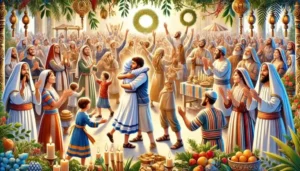
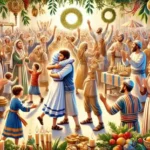
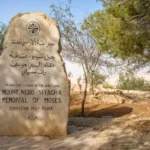

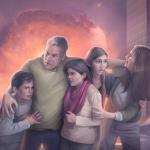
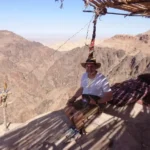
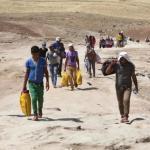


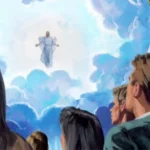
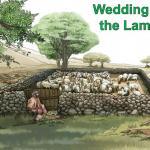
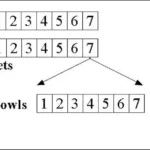
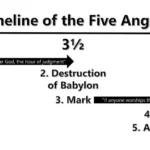
2 Responses
Very interesting, I’ll have to delve into that Steve!
Hi Steve
Thanks for sharing your concepts and deciphering this.
I know I’m heading to the mountains.